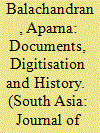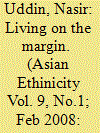| Srl | Item |
| 1 |
ID:
184804


|
|
|
|
|
| Summary/Abstract |
Recent years have seen a very large rise in digitisation projects in various state-administered archives in India, including the National Archives of India and regional archives in different parts of the country. This essay argues that rather than increasing access and transparency, digitisation serves to reproduce and potentially even increase state control over historical sources and memory. In addition, the elision of context in digitised collections in state archives poses problems for historical research, particularly for scholars from less privileged institutions. It is imperative that these efforts go beyond an understanding of digitisation as conservation alone in order to harness the creative and pedagogical possibilities offered by digital technology to influence, and even transform, the historical scholarship of a wide variety of users.
|
|
|
|
|
|
|
|
|
|
|
|
|
|
|
|
| 2 |
ID:
175525


|
|
|
|
|
| Summary/Abstract |
This article examines why the emancipation of ethnic groups has failed to address ethnic conflicts in Uganda. Successive Ugandan governments, especially the current regime of President Yoweri Museveni, have attempted to end the country’s history of ethnic strife by creating separate constituencies, separate districts and separate kingdoms for marginalised ethnic groups to free them from the domination of powerful ethnic groups. Focussing on the Rwenzori area of western Uganda where ethnic violence is severest, I show how the approach of ethnic emancipation reproduces ethnicity as the basis for political inclusion and escalates rather than abates ethnic contestations. This study should shed more light on the challenge of ethnic federalism in other countries like Ethiopia and Nigeria.
|
|
|
|
|
|
|
|
|
|
|
|
|
|
|
|
| 3 |
ID:
080622


|
|
|
|
|
| Publication |
2008.
|
| Summary/Abstract |
The Chittagong Hill Tracts (CHT) of Bangladesh has long been represented as a region of multi-ethnic setting, ethnic conflict and ethnic movement in South Asia. However, inter-ethnic relationship through the practice of unequal power and positions among the 'Pahari' (hill-people), the inhabitants of the CHT, has largely been ignored in the deeper understanding of the CHT. In addition, available CHT literature talks mostly about numerically dominant ethnic groups, whereas less attention is paid to the marginalized 'Pahari' ethnic groups. This paper examines the positioning of the 'Khumi', one of marginalized Pahari ethnic groups, within the larger canvas of CHT vs state across times and regimes. In an attempt to identify the position of the Khumi within the sociopolitical and ethnic history of the CHT, it seeks answers to three central questions: (a) How did the Khumi appear in the demographic configuration of the CHT? (b) How had they, along with the CHT and its other inhabitants, been dealt with during the colonial and postcolonial regimes? (c) How do they position themselves in the recurrent sociopolitical dynamics of CHT vs state relationship? The paper is based on critical consideration of secondary sources on the region in collaboration with relevant comprehensive data collected through ethnographic fieldwork undertaken from November 2005 to April 2007 in the CHT of Bangladesh
|
|
|
|
|
|
|
|
|
|
|
|
|
|
|
|